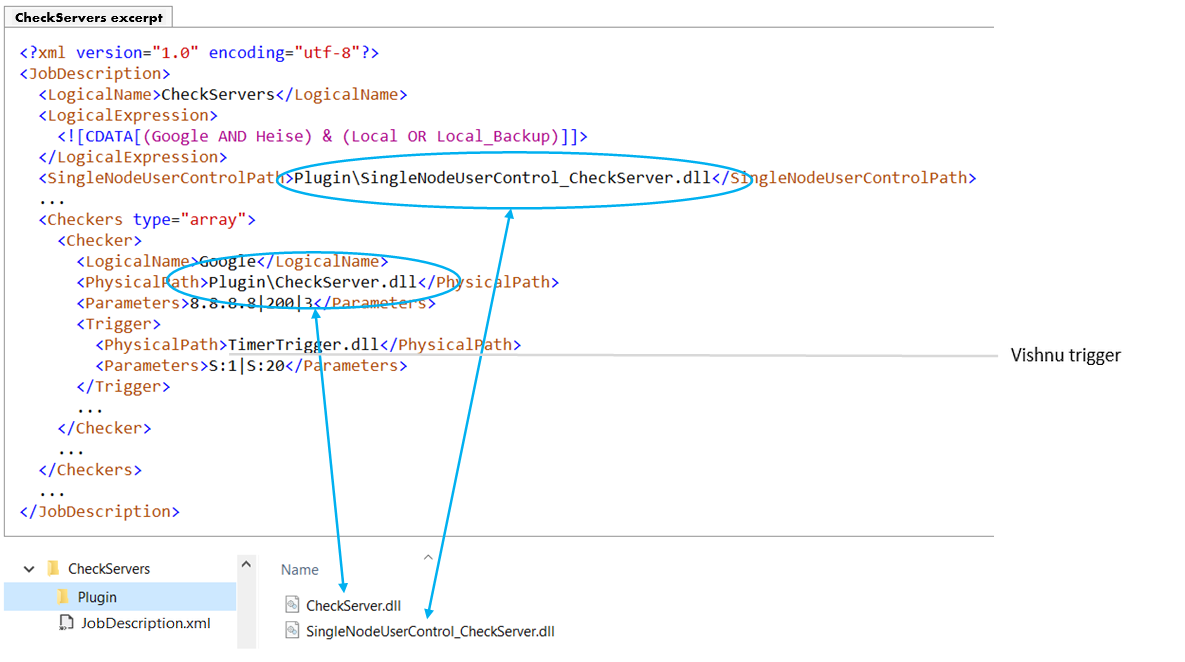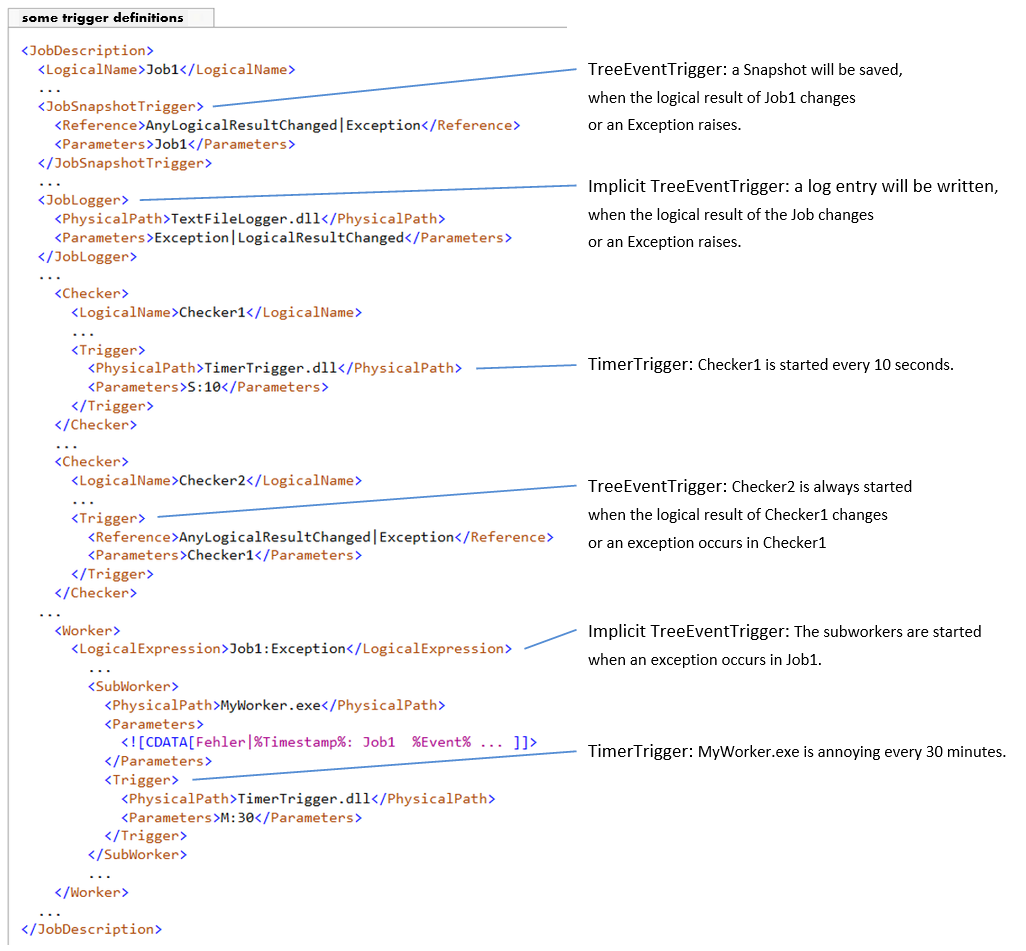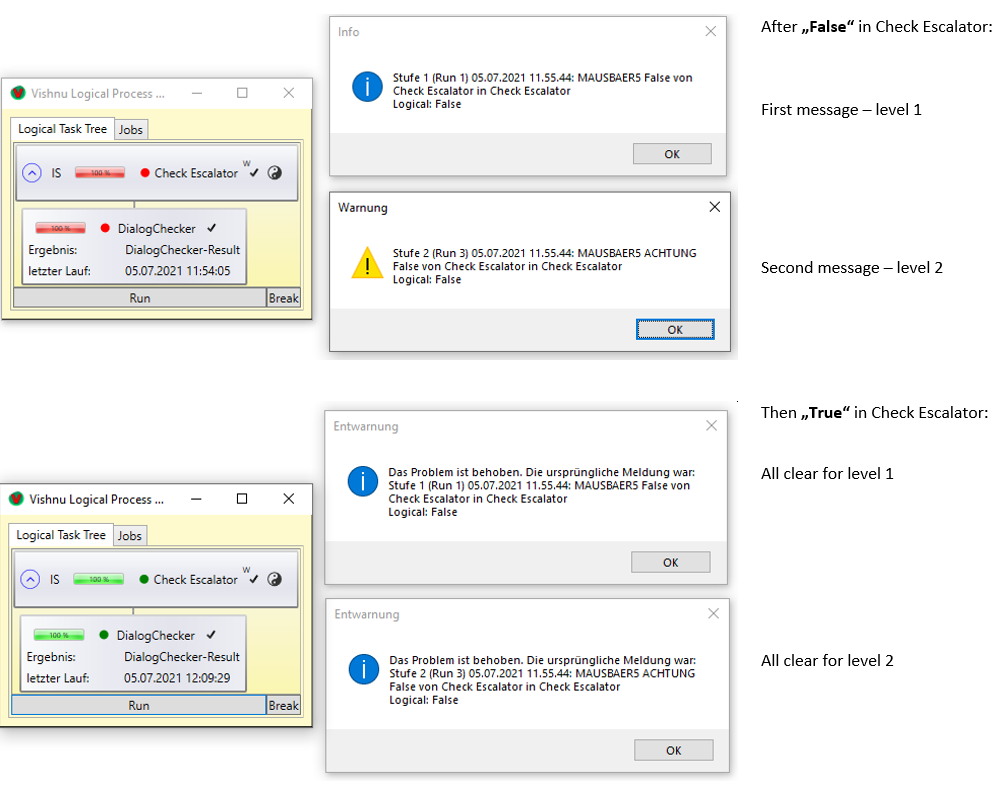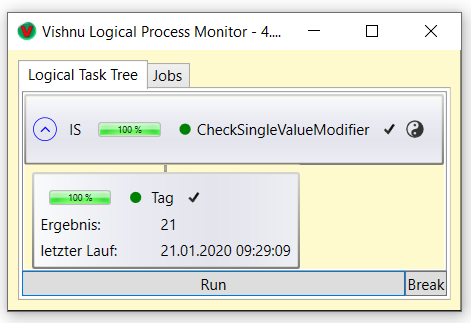Vishnu actors |
Here you will find details on various Vishnu-elements. In addition to general function descriptions, parameterisation and return values are also addressed and illustrated using XML examples.
Job is the topmost Vishnu-element.
A job corresponds to a directory with at least one JobDescription.xml-file
in which the Job is described in detail.
The job contains everything that Vishnu requires to be able to process orders.
How a JobDescription.xml is structured is described in A simple Example. You can find further Job-Examples on TreeEvents and Inline SubJobs, among others. |
Jobs with modules that are not located the UserAssemblyDirectory search these as loadable DLLs in a subdirectory "Plugin" (see the following excerpts from the Demo-SubJob CheckServers).

Vishnu can also process zipped jobs. The path to the zip archive containing the job directory must then be specified without the ".zip" extension. |
Checkers are the essential Vishnu-players. They are loaded dynamically by Vishnu and do the testing work. They must return a test result:
true = everything is ok
false = something is not ok
null = no decision can be made at the moment.
In addition to the regular results mentioned above, Checkers can also
encounter unexpected errors, e.g. if a server addressed is not available.
They then abruptly terminate the current run with an Exception.
Vishnu also processes these Exceptions and displays
them using a wrench symbol
|
In addition, each Checker has a public Return object, which can be used if necessary. Any complex issues can be passed on to your Custom Views by Vishnu.
You can specify call parameters for Checkers in the JobDescription.xml using the '<Parameters>' element, see the following example:
... <Checker> <LogicalName>Google</LogicalName> <PhysicalPath>Plugin\CheckServer.dll</PhysicalPath> <Parameters>8.8.8.8|200|3</Parameters> <Trigger> <PhysicalPath>TimerTrigger.dll</PhysicalPath> <Parameters>S:1|S:20</Parameters> </Trigger> <Logger> <Reference>FirstNamedLogger</Reference> </Logger> </Checker> ...
|
In addition to the parameters you pass, Checkers receive a TreeEvent from Vishnu. This can contain various other information, e.g. Return objects from other Checkers. Further details about Checkers can be found on Custom Checkers. |
Triggers ensure that the Checkers do their work. They trigger the Checkers or Workers at regular intervals or when certain events occur.
As with Checkers (see above), call-parameters for Triggers can be specified in the JobDescription.xml using the '<Parameters>' element.
Vishnu already provides three types of Triggers that should cover most use cases:
TimerTrigger
TimerTriggers call Checkers at regular intervals.
FileWatcherTrigger
FileWatcherTriggers call Checkers whenever observed files change.
TreeEventTrigger
TreeEventTriggers are Vishnu-internal triggers that react to events (TreeEvents) within the Vishnu-Tree and then can start Checkers.
 Note
NoteEven though TreeEventTriggers are Vishnu internal modules, they can be configured in the JobDescription.xml like other triggers. For more information see TreeEvents.
The following example shows various Triggers and their call parameters.

Workers are groups of one or more SubWorkers each with an EXE-program, which is started by Vishnu when certain TreeEvents defined for the Worker occur. What the EXE-programs of the SubWorkers do and whether or how they react to passed parameters, is entirely up to the programs. Vishnu is not interested in their results (fire and forget).
Workers are always triggered depending on one or more TreeEvents.
This is determined via the attribute <LogicalExpression> in the form
<LogicalExpression>triggering node:TreeEvent[|TreeEvent]</LogicalExpression>
(see also the example below).
As with Checkers and Triggers, call-parameters for SubWorkers are passed in the JobDescription.xml using the '<Parameters>' element.
Vishnu prepends a severity level as an integer value to the call-parameters you define. If this value is negative, it means that the TreeEvent(s) triggering the worker no longer exist.
Since the parameters are passed to SubWorkers via the command line,
no additional TreeEvent can be passed
as it is possible with Checkers. |
... <Workers type="array"> <Worker> <LogicalExpression>Heise:False|Exception</LogicalExpression> <SubWorkers type="array"> <SubWorker> <PhysicalPath>VishnuMessageBox.exe</PhysicalPath> <Parameters>-Message="%Timestamp%: CheckServers %Event% from %Source% in %Sender%#%Exception%" -Caption="Server Error" -MessageNewLine=#</Parameters> </SubWorker> <SubWorker> <PhysicalPath>MicroMailer.exe</PhysicalPath> <Parameters><![CDATA[-Message="%Timestamp%: CheckServers %Event% from %Source% in %Sender%#%Exception%." -Caption="Server error!" -MailHostPort=%MailHostPort% -MailPassword=%MailPassword% -MailSender="Sender" -MailRecipients="Recipient1[,Recipient2,...]"]]></Parameters> <!-- Trigger> <LogicalName></LogicalName> <PhysicalPath>TimerTrigger.dll</PhysicalPath> <Parameters>M:20</Parameters> </Trigger --> </SubWorker> </SubWorkers> </Worker> ... </Workers> ...
In the previous example, the call parameters for the SubWorker "MicroMailer" are not formulated, but are transferred via the environment. You should enter the parameters of your e-mail provider here, or rather elsewhere, eg. in the environment. |
|
SubWorkers can also have Triggers assigned to them, as in the previous example with the "MicroMailer" (commented out). These then fire repeatedly until the TreeEvent(s) triggering the Worker no longer exist. |
An Escalator can be used to assign different
Workers to different levels of severity.
A typical application example is an undesirable result from a Checker (usually false or exception),
which is responded to by an error message on the screen in the first step.
Only if there is no response after a certain period of time does a further step follow, for example an email (escalation).
See the following example:

Below you can see the definition of the Escalator from the above example in the JobDescrition.xml.
... <Worker> <LogicalExpression>Check Escalator:False</LogicalExpression> <SubWorkers type="array"> <SubWorker> <PhysicalPath>Escalator.exe</PhysicalPath> <Parameters Transport="File"> <SubWorkers type="array"> <SubWorker RunCounter="1"> <PhysicalPath>VishnuMessageBox.exe</PhysicalPath> <Parameters>-Message="Stage 1 (Run 1) %Timestamp%: %MachineName% %Event% from %Source% in %Sender%#Logical: %Logical% %Exception%" -Caption="Info" -MessageNewLine=#</Parameters> </SubWorker> <SubWorker RunCounter="3"> <PhysicalPath>VishnuMessageBox.exe</PhysicalPath> <Parameters>-Message="Stage 2 (Run 3) %Timestamp%: %MachineName% ATTENTION %Event% from %Source% in %Sender%#Logical: %Logical% %Exception%" -Caption="Warning" -MessageNewLine=#</Parameters> </SubWorker> </SubWorkers> </Parameters> <Trigger> <PhysicalPath>TimerTrigger.dll</PhysicalPath> <Parameters>S:10</Parameters> </Trigger> </SubWorker> </SubWorkers> </Worker> ...
As you can see, the Escalator acts like a Worker. |
ValueModifiers take over Results from other Checkers and present them in a modified form.
In the following screenshot of the demo job CheckSingleValueModifier can be seen,
that the "Result" in the "Day" node only shows the day of the date (here 21).
 .
.
In the associated JobDefinition.xml you can see that the
Checker date does not even belong to the LogicalExpression
<IS Tag> of the Job.
However, it is executed by the Job as an anonymous node
in the background and can then be accessed via the visible ValueModifier
Day by <Reference>Date</Reference>.
<?xml version="1.0" encoding="utf-8"?> <JobDescription> <LogicalName>CheckSingleValueModifier</LogicalName> <LogicalExpression> IS Tag </LogicalExpression> <Checkers type="array"> <Checker> <LogicalName>date</LogicalName> <PhysicalPath>CheckDate.dll</PhysicalPath> </Checker> </Checkers> <ValueModifiers> <ValueModifier> <LogicalName>Day</LogicalName> <Reference>date</Reference> <Type>int</Type> <Format>{0:dd}</Format> </ValueModifier> </ValueModifiers> </JobDescription>
Furthermore, it can be seen that the ValueModifier needs two additional parameters:
Type The desired result type of the ValueModifier, here int (.Net-Int32)
Format The format for displaying the result of the ValueModifier.
 Note
NoteFor "Format" you can specify any suitable C# format string.
The ValueModifier shown above is already provided by Vishnu. It offers conversions for the following result types:
Boolean
Int16
Int32
Int64
DateTime
String
|
You can also create your own ValueModifiers. How to do this is described on Custom ValueModifiers. |
<?xml version="1.0" encoding="utf-8"?> <JobDescription> <LogicalName>CheckServersLogging</LogicalName> <LogicalExpression> <![CDATA[(Google AND Heise) & (Local OR NotPresent)]]> </LogicalExpression> <SingleNodeUserControlPath>Plugin\SingleNodeUserControl_CheckServer.dll</SingleNodeUserControlPath> <Checkers type="array"> <Checker> <LogicalName>Google</LogicalName> <PhysicalPath>Plugin\CheckServer.dll</PhysicalPath> <Parameters>8.8.8.8|200|3</Parameters> <Trigger> <PhysicalPath>TimerTrigger.dll</PhysicalPath> <Parameters>S:1|S:20</Parameters> </Trigger> <Logger> <PhysicalPath>TextFileLogger.dll</PhysicalPath> <Parameters>Exception|LogicalResultChanged</Parameters> </Logger> </Checker> <Checker> <LogicalName>Heise</LogicalName> <PhysicalPath>Plugin\CheckServer.dll</PhysicalPath> <Parameters>www.heise.de|200|3</Parameters> <Trigger> <PhysicalPath>TimerTrigger.dll</PhysicalPath> <Parameters>P:3|P:20</Parameters> </Trigger> </Checker> <Checker> <LogicalName>Local</LogicalName> <PhysicalPath>Plugin\CheckServer.dll</PhysicalPath> <Parameters>Localhost|1000|3</Parameters> <Trigger> <PhysicalPath>TimerTrigger.dll</PhysicalPath> <Parameters>P:20|P:300</Parameters> </Trigger> </Checker> <Checker> <LogicalName>NotPresent</LogicalName> <PhysicalPath>Plugin\CheckServer.dll</PhysicalPath> <Parameters>9.8.7.6|200|3</Parameters> <Trigger> <PhysicalPath>TimerTrigger.dll</PhysicalPath> <Parameters>P:2|P:20</Parameters> </Trigger> <Logger> <PhysicalPath>TextFileLogger.dll</PhysicalPath> <Parameters>Exception|LogicalResultChanged,%TempDirectory%\xyz.log</Parameters> </Logger> </Checker> </Checkers> </JobDescription>
The first of the two Loggers defined in the demo job above writes
to the Vishnu-log file by default, the second logger writes to its own
log file
As a reminder: the Vishnu-log file is %TempDirectory%\Vishnu.%MainJobName%\Vishnu.log
by default.
The Logger produces the following results:
... 2020.01.24 09:23:03,952339 Event: LogicalResultChanged Node: Google|Google, Logical: True, Source: Google AnyServer, Thread: 0020/08904, Tree: Tree 1 AND(CheckServersLogging)/AND(Internal_1)/Google, Status: Done WorkingDirectory: C:\Users\<user>\AppData\Local\Temp\Vishnu.CheckServersLogging\20544 ...
2020.01.24 09:23:05,963918 Event: LogicalResultChanged Node: NotPresent|NotPresent, Logical: False, Source: NotPresent AnyServer, Thread: 0022/19564, Tree: Tree 1 AND(CheckServersLogging)/OR(Internal_2)/NotPresent, Status: Done WorkingDirectory: C:\Users\<user>\AppData\Local\Temp\Vishnu.CheckServersLogging\20544
|
The TextFileLogger.dll is a simple demo DLL that Vishnu already supplies. The content and form of the logging output are hard-wired into the TextFileLogger.dll. To determine the content and form of the logger output, you can also create your own Loggers. How to do this is described on Custom Loggers. Your own Loggers can then also interpret additional transfer parameters that control the output format. It is up to you which parameters you pass to the logger after the comma. Vishnu simply passes these on to your logger. |
|
By the way: the TextFileLogger.dll is found by Vishnu, even though it is not in the Plugin-directory of the demo job. The reason for this is that the DLL is in the UserAssemblyDirectory. |
